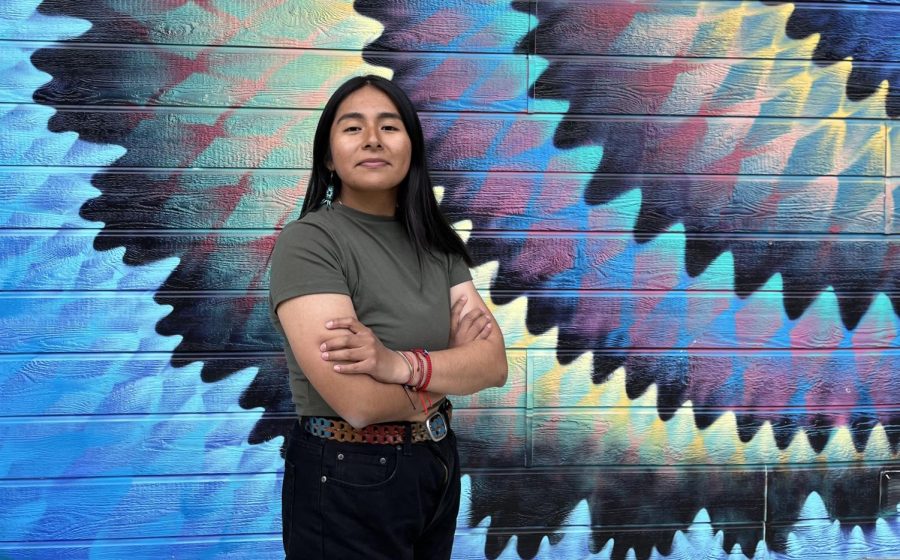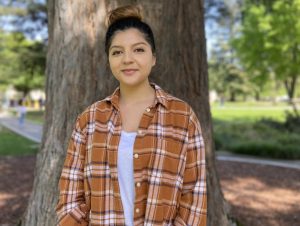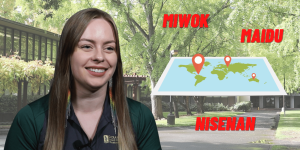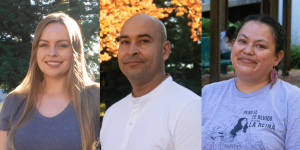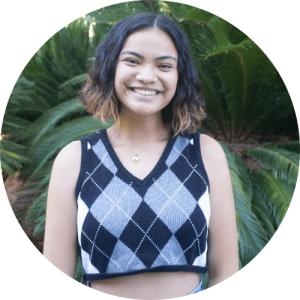‘I still haven’t come out yet’: First-generation queer Indigenous student balances their identities
Rosalba Gomez-Bautista, second year political science major and ethnic studies minor poses in front of the mural on the Studio Theater on Tuesday, April 12, 2022. “We don’t want to be generalized as just Mexicans, we deserve to be represented and it’s very empowering especially now to be Indigenous and to claim that identity,” Gomez-Bautista said. (Photo by Hannah Asuncion)
May 2, 2022
Editor’s note: The subject of the story goes by they/them/their/theirs and is referred to throughout the story.
In the beginning of the spring semester, Rosalba Gomez-Bautista was thrilled for their Mexican-American experience class, but according to them, it took a turn once their professor gave them a harmful response.
One of Gomez-Bautista’s ethnic studies professors told them that the topic of Indigenous experiences wasn’t in their syllabus and instead of providing materials for them, they recommended they go to a different class.
“The limitation of the material that’s presented in the courses has been a huge setback because if students aren’t aware, then how are we going to get support from this institution?” Gomez-Bautista said.
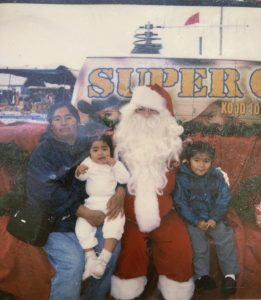
In their younger years in elementary school, Gomez-Bautista used to be a field worker with their family in the Central Valley. They would even migrate to Oregon on occasion to pick blueberries, strawberries, raspberries and blackberries.
During their breaks, Gomez-Bautista said their parents would tell them that education will always come before anything else since there are so many opportunities they can earn by getting one.
In Gomez-Bautista’s first semester at Sac State, they said they were a bit afraid of expressing their identity before finding a space in Mujeres Ayudando la Raza.
MAR is a community-based non-profit organization that offers a space for Chicana/Latina students to create support for one another– like supplying feminine products and scholarships to students, according to its members.
Gomez-Bautista is a second year political science major with a minor in ethnic studies. Before that, they are a non-binary student from the Mixtec nation representing Ñuú Saví and Ñuú Snuviko community.
According to Gomez-Bautista, being a first-generation student in their family has been empowering not just for them, but for their parents and their community as well.
“It really does take my breath away. This is for my community; this is for my people; this is for the Ñuú Saví and Ñuú Snuviko people,” they said. “There’s a sense of identity that comes with it too so I think that’s why I’m heavily trying to represent us here in higher academics.”
Gomez-Bautista was born in Fresno, California, but moved to Kerman, California, at age seven. In Jan. 2022, they moved to Sacramento to attend Sac State after it was announced that classes would be in-person again.
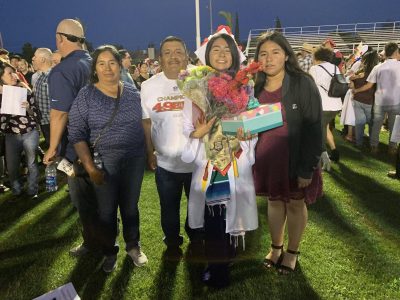
They said they learned a lot from going to Kerman High School. Their English and history teachers contributed to their interests in political science and their interest in being involved in school, which they try to continue at Sac State.
Gomez-Bautista has been working with the Center of Race, Immigration and Social Justice organization (CRISJ) and is part of their podcast committee.
Professor Monicka Tutschka, a political science professor who is also the head of the podcast committee of CRISJ, has been mentoring Gomez-Bautista. Tutschka said she believes Gomez-Bautista’s advocacy will have a big impact but it depends on how the activism is conducted.
“The university is a kind of bureaucratic labyrinth, but if you have energy and you’re willing and patient, there’s a lot of resources,” Tutschka said.
According to Tutschka, it’s possible for Gomez-Bautista to make a difference in their community as long as they know where their funding comes from and do what they need to make sure it is sustainable.
Aside from the podcast committee, CRISJ holds different committees, and since Gomez-Bautista is involved with them now, they said they are trying to get Indigenous students to be represented in each of the committees by showcasing all their voices.
“I’m hoping to establish some type of organization or effect here on campus and when I graduate I can leave a safe space, or presence or some type of recognition, for Indigenous students,” Gomez-Bautista said.
Diana Rangel is a fourth-year ethnic studies major and an advocate for Indigenous students. She said she plans to help Gomez-Bautista by being their support system either as a mentor or by mentioning their ideas in front of influential people.
“Although I cannot identify as Indigenous, I do understand the movement, experiences, and purpose of Indigenous people– and that is sovereignty,” Rangel said. “It is important to keep the voices of these students heard and it is important that we continue to advocate for them as the government and genocide has caused enough damage.”
Aside from being a part of the Indigenous community, Gomez-Bautista said they have also struggled with their identity in the LGBTQ+ community since many Indigenous communities are heavily religious and aren’t often accepting of various lifestyles.
“I still haven’t come out,” they said. “I think it’s not because I’m not ready. I’m proud of being queer, I’m proud of this community as well. It’s just [that] I feel like my parents aren’t ready and I don’t want to put them through that.”
Some Indigenous regions in Southern Mexico have protected spaces for indigenous LGBTQ+ communities known as Muxe, which means “two-spirited.”
According to Gomez-Bautista, Muxe still carry masculine energy and faces, but they don’t try to change who they are; they wear dresses and they braid their hair. Depending on which cities or states they are in, they are heavily respected and seen as very beautiful and empowering.
“I can be two things since I’m non-binary and two-spirited,” they said. “It has been very confusing like ‘Am I a woman? Am I a man? Am I everything or am I nothing?’”
It wasn’t until their first year of college where they said they found a much larger Indigenous community through social media. This is where they found mutual friends who were both Indigenous and queer.
“It’s okay to express these different identities and I don’t have to repress one to become the other, you know? I’m just as important,” Gomez-Bautista said.
When they saw that Sac State had a Pride Center which was something they wouldn’t see back home, they immediately felt a lot more comfortable, they said.
“It’s a lot more liberating here on campus where I get to meet other queer people as well– where we actually get to share experiences and stories,” Gomez-Bautista said. “So it definitely has been challenging, but it’s a very beautiful journey that I’m still going through.”
Gomez-Bautista said they want to be an educator who can provide knowledge and opportunities to other Black Indigenous people of color, queer students or students who carry multi-intersectional identities.
“Being Indigenous here on campus, I carry that with so much pride as well as I do for my other identities, but I carry this one with so much pride,” Gomez-Bautista said. “I understand the history and what this means for my parents and what this means for my little sister and my family members.”


























































































































